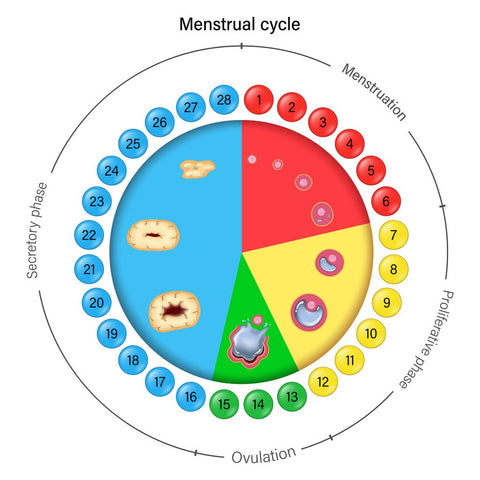Many women find they gain weight during menopause, even though they don't eat more or exercise less than before. This can be frustrating, but it has a clear cause. Your hormones, metabolism, and body composition change, and that affects your weight.
In this blog you can read all about why you gain weight during menopause, when it starts, how you notice it, what you can do about it every day and whether it ever stops.
When does weight gain start?
Menopause officially begins when you haven't had a period for twelve months. This usually occurs between the ages of 45 and 55, but the phase before that—perimenopause—can begin years earlier.
During perimenopause, which typically lasts four to ten years, your hormones begin to fluctuate. Many women notice the first signs of weight gain, especially around the abdomen.
How do you notice it?
You will mainly gain weight around your belly, while previously you may have stored more fat on your hips and thighs.
You notice that your clothes fit tighter, without your eating habits having changed.
Losing weight becomes harder, even if you eat less or exercise more.
You often suffer from a bloated feeling.
Your energy levels fluctuate more, making you less motivated to stay active.
Why do you gain weight during menopause?
1. Your metabolism slows down
From age 40, your basal metabolic rate slows. This means you burn an average of 400 fewer calories than before, even if you eat exactly the same amount. This is partly due to a decrease in muscle mass, but also to hormonal changes.
2. Estrogen drop leads to more belly fat
Estrogen plays a major role in where your body stores fat. During their reproductive years, women typically store fat around their hips and thighs. But as estrogen levels drop, this fat storage shifts to the abdomen. This can lead to the infamous "menopausal belly."
3. Less muscle mass means less fat burning
As you age, your muscle mass decreases, and muscle burns more calories than fat. This reduces your daily calorie expenditure and can lead to weight gain, even if your diet doesn't change. Therefore, heavy strength training is essential for maintaining muscle mass and keeping your metabolism active. Strength training with weights or resistance exercises can help prevent muscle loss and boost your metabolism.
4. Insulin resistance increases
Due to the hormonal fluctuations of menopause, your blood sugar levels can fluctuate more frequently. This makes you more sensitive to fast carbohydrates and sugars, which further stimulates fat storage.
5. Stress and sleep problems increase cortisol
Many menopausal women struggle with sleep problems and stress. This increases the production of cortisol, a stress hormone that stimulates fat storage, especially around the abdominal area.
What can you do about it on a daily basis?
1. Adjust your diet to your hormonal needs
Eat more protein → Helps maintain muscle mass and keeps you feeling full for longer. Think chicken, fish, eggs, and vegetable proteins.
Choose healthy fats → Avocados, nuts, olive oil and oily fish support your hormone balance.
Avoid fast sugars and processed carbohydrates → These cause blood sugar fluctuations and fat storage. Instead, choose whole grains, vegetables, and legumes.
Drink enough water → This aids digestion and prevents your body from retaining fluid.
2. Do strength training and exercise
Heavy strength training → Building muscle mass is crucial for keeping your metabolism active. Strength training two to three times a week helps strengthen your muscles and stimulate fat burning.
Cardio in Balance → Long cardio sessions can increase stress hormones, so combine light cardio with strength training and relaxation exercises such as yoga or walking.
Move daily → Even if you don't have time for a full workout, try to walk more and move more often throughout the day.
Besides the physical benefits, strength training also has a huge impact on well-being. Menopause can be accompanied by mood swings, stress, and sometimes even depression. The endorphins released during exercise help improve mood and provide a sense of strength and control. This is especially important during a time when many women feel insecure about the changes in their bodies.
3. Reduce stress and improve your sleep
Get enough sleep → Lack of sleep increases your appetite and fat storage. Create a regular sleep schedule and avoid screens before bed.
Practice stress management → Yoga, meditation, and breathing exercises help lower cortisol.
Take time to relax → Too much stress and a busy life can further unbalance your hormones.
4. Support your body with supplements
Vitamin D → Many women have a vitamin D deficiency, which affects fat storage and hormone balance.
Magnesium → Helps with relaxation, reduces stress and supports a good night's sleep.
Omega 3 fatty acids → Have anti-inflammatory properties and support metabolism.
When will weight gain stop?
Menopausal weight gain isn't a permanent condition, but without adjustments, it can continue to accumulate. After the first few years of menopause, your body stabilizes and hormonal fluctuations become less severe. This means weight gain slows down, but if you don't take action, your metabolism will remain slower than before.
With the right diet, exercise, and lifestyle choices, you can support your body and prevent weight gain every year.
Discover how our app can help you
On March 16th we launch FEMME FLOW, eating according to the cycle and meno in the Killerbody food app .
Looking for a nutrition plan perfectly suited to your menopausal needs? The Killerbody Food App can help! The app lets you choose from various diet options, including keto, low-carb, and balanced , all tailored to menopause and taking your goals and metabolism into account . Our app creates a personalized meal plan and gives you insight into your eating habits and progress.
Download the Killerbody Food App here and discover how you can optimally support your body with the right nutrition and lifestyle!
Or for immediate results, start with the back in shape program
https://killerbodyfood.com/products/back-in-shape-in-14-days




